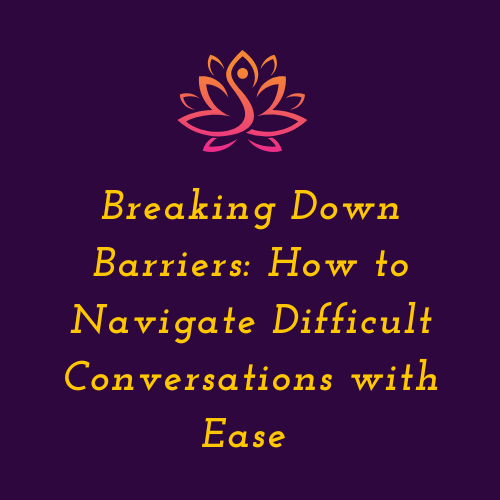Breaking Down Barriers: How to Navigate Difficult Conversations with Ease

Let’s face it—difficult conversations are uncomfortable. Whether it’s confronting a friend about a misunderstanding, discussing a sensitive issue with a loved one, or addressing feedback with a colleague, these moments can make us feel anxious and stressed. But here’s the truth: avoiding tough conversations often leads to more tension and unresolved issues. On the other hand, learning to navigate these conversations with ease can open up pathways to stronger relationships and personal growth.
Imagine having the confidence to handle any challenging discussion that comes your way. Imagine building trust and understanding, even in the most difficult moments. Sounds empowering, right? Let’s dive into some practical strategies to help you approach tough conversations with calm, clarity, and confidence.
Why Difficult Conversations Matter
First, let’s talk about why these conversations are so important. Avoiding them might feel like a quick fix, but it usually leads to unresolved feelings and growing resentment. In relationships, misunderstandings can pile up. In the workplace, lack of communication can cause projects to go off track. But when we face these conversations head-on, we create space for growth, understanding, and deeper connections.
Conversations around sensitive topics give us a chance to practice empathy, set boundaries, and clear up any miscommunications. When handled with care, they can transform misunderstandings into mutual respect and unresolved issues into collaborative solutions.
Think about a difficult conversation you’ve been avoiding. What would it feel like to address it finally?
Practical Tips to Approach Difficult Conversations
If you’re ready to tackle tough conversations with ease, here are some practical strategies that can help make these moments less daunting.
1. Prepare with a Calm Mind
Before jumping into a challenging discussion, take a moment to prepare. This doesn’t mean rehearsing every word but gathering your thoughts and emotions. Take a few deep breaths, take a short walk, or spend a few moments reflecting on the core issues. A calm, centered mind will help you communicate more clearly and avoid reactive responses.
Jot down a few key points to keep the conversation focused. Having a roadmap is okay, but stay open to where the discussion may go.
2. Set a Positive Intention
Approaching a difficult conversation with the right intention can make all the difference. Rather than focusing on “winning” the conversation or proving a point, try setting a positive goal, like “I want us to understand each other better” or “I want to find a solution that works for both of us.” This shifts the focus from conflict to collaboration.
Before starting, let the other person know your intention. For example, “I’d like us to have an open, respectful conversation about this.”
3. Listen First, Then Speak
It’s tempting to explain your perspective, especially when emotions are high. But in challenging conversations, listening is a powerful tool. Give the other person space to share their thoughts and feelings without interruption. Often, simply allowing them to be heard can defuse tension and lead to a more open dialogue.
Use phrases like “I hear you” or “I understand where you’re coming from” to show that you genuinely listen. This will make the other person feel valued and open the door for a constructive exchange.
4. Stay Focused on the Issue, Not the Person
It’s easy to get personal when emotions run high, but this can escalate tension. Instead, keep the conversation focused on the issue at hand. Avoid using language that blames or criticizes the person directly. For instance, instead of saying, “You never listen to me,” try framing it as, “I feel unheard when I don’t get a chance to express my thoughts.”
Tip: Stick to “I” statements (e.g., “I feel…” or “I need…”) to avoid sounding accusatory. This keeps the conversation constructive and helps prevent defensiveness.
5. Take Responsibility for Your Feelings
It’s natural to feel hurt or upset in challenging conversations, but it’s important to own those feelings without placing blame. If something upsets you, acknowledge it and share it honestly without making it seem like the other person’s fault. This allows you to be authentic and vulnerable while keeping the conversation respectful. Use phrases like “I feel [emotion] because…” rather than “You made me feel…” This approach shows maturity and keeps the conversation balanced.
6. Know When to Take a Break
Sometimes, a difficult conversation can get intense, and that’s okay. If emotions are running too high, don’t be afraid to suggest taking a break. Pausing allows everyone to cool down, gather their thoughts, and return with a clearer perspective. It’s far better to step away briefly than to push through and risk saying things you don’t mean.
Try saying, “I think we could both benefit from a short break to process. Let’s continue this conversation when we’re both ready.” This can be a simple but powerful way to reset the tone.
Embrace Growth Through Difficult Conversations
Difficult conversations may never be easy, but with practice, they become less intimidating. They’re an opportunity to grow, to deepen your relationships, and to strengthen your communication skills. When you handle these moments with empathy, openness, and respect, you’re not just addressing an issue—you’re building a foundation of trust and understanding.
Ready to Master the Art of Difficult Conversations?
If these tips have sparked ideas on how to navigate tough discussions, you’ll love my upcoming book, “Communication: The Key to Your Success.” It’s filled with insights and strategies to help you handle difficult conversations with ease, cultivate empathy, and communicate effectively, even in challenging situations.
Stay tuned for the release, and in the meantime, start practicing these tips in your daily interactions. You’ll be amazed at how quickly you start to feel more comfortable with tough conversations.
#EffectiveCommunication #NavigatingConflict #DifficultConversations #EmpathyInAction #PersonalGrowth #RelationshipBuilding #BetterCommunication #ListenFirst #CommunicationTips #ConflictResolution



